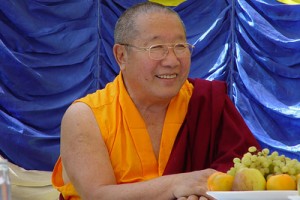
From The Spiritual Path: A Compilation of Teachings by Jetsunma Ahkon Lhamo
The quality of joy is not as we usually think of it. Our culture teaches—though we may not be consciously aware of this—that to be happy, we should act happy. By developing a positive attitude, we will look happy and become happy. We are also taught to keep up with the Joneses. We are taught to get ahead—or be left behind. We expect joy to come from getting what we want.
The joy of which the Buddha speaks is vastly different. Once we realize equanimity, loving kindness, and compassionate concern—then, when we hear that someone has a new car, we will be happy for that person: he has attained at least some temporary happiness. There is no need for judgments such as: “Many people are starving, yet he spends so much on a new car.” Or: “He already has three cars. Why does he need a fourth?” The Buddhist attitude is: the happier you are, the happier I am. If even for one moment you have achieved some level of happiness, I should be joyful and think: “I love you so much I wish you could have everything that makes you happy. May your happiness bring you to a point of great stability and regard for others. May it afford you the generosity to wish for their well-being to the extent that you will attain realization. May that car somehow promote your realization, and may you be free of suffering in all its forms.”
This joy in the happiness of others can only be attained when equanimity, loving kindness, and compassion are realized. It is a joy that occurs naturally. It occurs from sincerely wishing for the happiness and well-being of all sentient beings, for the end of their suffering. To the extent that any degree of relaxation, peace, or alleviation of suffering is of any benefit to them, I am happy because they are the same as I and not separate from me. In other words, I realize that the nature of “me” and “other” are that same Suchness and have the same taste. Without these four qualities, known as the Four Immeasurables, and the pure view implied by their attainment, there is no enlightenment. This attainment has not come easily to anyone. When you think about all the great Buddhas and Bodhisattvas who have the means to liberate minds, remember that they all began as sentient beings. They all used the same methods that are offered to you. Through determination, you too will develop the Four Immeasurables. There is no doubt that they are within you.
© Jetsunma Ahkön Lhamo










